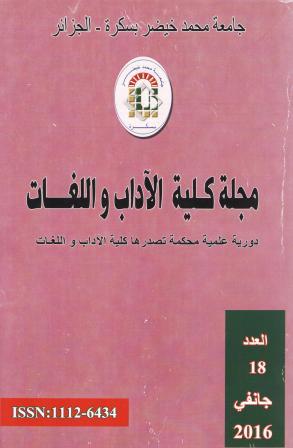How Can Students' Learning Styles Influence English language Learning and Teaching?
Résumé
يجد طلبة اللغة الانجليزية صعوبات في مادة اللسانيات و مواد أخرى و ذلك يعود إلى اعتمادهم على الاستاد في الشرح و المطبوعات و غيرها. في حين انه مند تطبيق نظام ال ل.م.د في 2004 لم يعد ينظر للطلبة متلقين بل باحثين عن المعلومة و عناصر فاعلة في العملية التعليمية. ولتمكين هؤلاء الطلبة من التأقلم و التحصيل أكثر في هذا الوسط الجديد’ فإن هذه الدراسة خصت مجموعة (30 طالبا) من طلبة السنة الأولى باستبيان للإجابة على السؤال "أي نوع من الطلبة أنت/م". فالفرضية الأساسية لهذه الدراسة هي أن معرفة و وعي الطالب بأسلوبه في التعلم مهم جدا وهو ما يسمح له ببناء استراتيجياته التعليمية الخاصة داخل القسم. أدت هذه الدراسة إلى استخراج ثلاثة أنواع من الطلبة في الفوج المعني. إن تحليل النتائج و مناقشتها مكن الباحثين من استخلاص ردود فعل الطلبة و شعورهم بعد تعرفهم على أنفسهم كمتعلمين ومدى استحسانهم لاكتشافهم لعناصر الضعف و القوة في أنفسهم و كيفية استثمارها في العمل الأكاديمي.
EFL studentsusually feel lost in Linguistics and other courses because they come to the university with their traditional learning habits, such as relying on the teacher's handouts and his explanations. However, since 2004, students have not been seen as recipients of knowledge and information. The LMD model has led to irrevocable changes, especially in the learner's role: the learner has become a real knowledge-seeker. To help these students to cope with English language classes and to achieve better, the present study employed a questionnaire to find answers to the question, "What kind/type of learners are you?" Our hypothesis starts from the assumption that an awareness of the learners' learning styles is very beneficial. This study singled out three categories of learning styles from a group of thirty (30) first year students. The analysis of the results enabled the researchers to elicit the respondents' reactions and feelings about the discovery of their categories as EFL learners. The results show that students really need to discover their learning styles so as to build their learning strategies.
Références
a) You do not take notes, but listen very carefully
b) You sit near the front of the room and watch the lecturer
c) You take notes
2. Do you usually solve a problem by:
a) Talking to yourself or a friend
b) Using an organized, systematic approach like lists, etc.
c) Walking, pacing or some other physical activity
3. Do you find it easier to learn something new by:
a) Listening to someone explain how to do it
b) Watching a demonstration of how to do it
c) Trying it yourself
4. If you don’t know how to spell a word, do you:
a) Sound it out
b) Try to see it work in your mind
c) Write the word in several ways and choose the one that looks right
5. Do you enjoy reading most when you can read:
a) Dialogue between characters
b) Descriptive passages that allow you to create mental pictures
c) Stories with lots of action in the beginning (because you find it difficult to concentrate early on)
6. Do you remember people you have met by their:
a) Names
b) Faces
c) Mannerisms, movements, etc.
7. Are you distracted mainly by:
a) Noises
b) People
c) Environment (temperature, comfort of furniture, etc.)
II.1.2. Count the total numbers which fall into the following categories
a) …………… Auditory (by hearing)
b) …………… Visual (by seeing)
c) …………… Kinaesthetic (by touching, doing or moving)
Source: adapted from University of Newcastle upon Tyne. (n.d). Study Skills Guide: Disability Support Service University of Newcastle upon Tyne, n.p.


